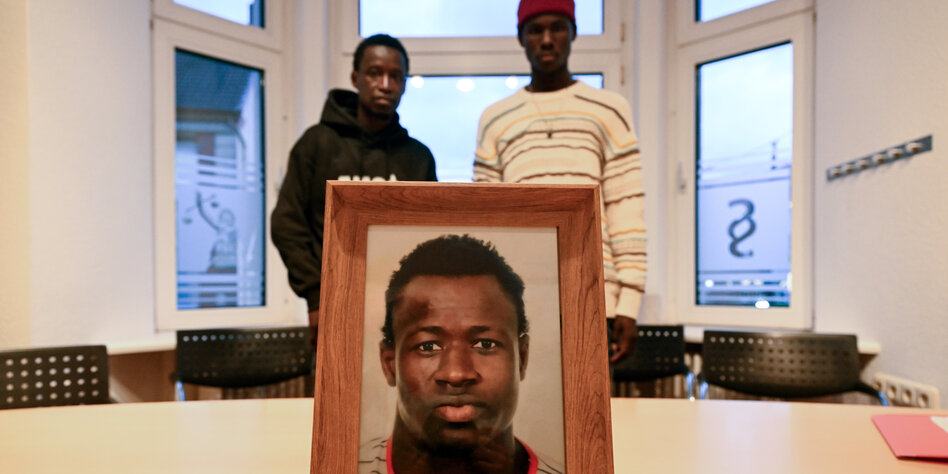In August 2022, refugee Mouhamed Dramé was shot dead by police. The failure of the State is revealed before the court in the first days of the trial.

The Mouhamed Dramés brothers, Sidy and Lassana, attend the trial in Dortmund Photo: Federico Gambarini photo/alliance
DORTMUND taz | In cell 130 of the Dortmund regional court, police commissioner Fabian S. speaks calmly but firmly. On August 8, 2022, the officer, then 28 years old, fired 6 shots from a submachine gun at Mouhamed Lamine Dramé, a refugee from Senegal. He hit the suicidal man in the face, neck, shoulder, arm and stomach. Dramé died in hospital shortly afterwards. And Fabián S. has had to answer for homicide since December 9, 2023.
The suspended police officer also appeared injured on Wednesday. He only found out about the death of the 16-year-old teenager after finishing the mission, at the police station in the northern part of the city of Dortmund, where there is a population of immigrants. “It is as if the heart stopped,” says Fabián S. in his first statement before the court on this 13th day of the trial. “I asked myself every day what I could have done differently. I see his face every day,” says the inspector.
A conviction would mean the end of his police career. At the beginning of the trial, the shooter had his lawyer Christoph Krekeler explain that he felt threatened by the 16-year-old. “In this situation,” Krekeler stressed, “my client did not care at all about Mouhamed Dramé's skin color.”
Activists are not the only ones accusing the police of “structural racism.” They believe that nothing more cost Mouhamed Dramé his life. Because the police operation, which witnesses and defendants repeatedly describe in court and which cost the teenager his life, is disturbing every time it is described.
In the end, a cry for help triggered the fatal shots: on Monday, August 8, 2022, the refugee was sitting in the courtyard of a youth welfare center. The 16-year-old holds a knife against his stomach. The caregivers talk to him, but Dramé does not react and does not let go of the kitchen knife. At 4:25 p.m., the director of the youth welfare center called the police for help by phone. At 4:44 p.m., just 22 minutes after the emergency call, Fabian S. shot. In addition to him, four other police officers were charged: three of them with serious bodily injury and the director of operations, Thorsten H., with incitement to do so. .
Irritating gas without alternative?
Also disturbing was the way Thorsten H. described the catastrophically failed operation he led on day 11 of the trial in April. The plan was to use a large amount of pepper spray to make Dramé rub his eyes and then drop the knife, the service group leader explained. For self-protection, two “remote electrical impulse devices”, that is, electric shocks, and a submachine gun were also placed.
Operations Chief H. still believes there was no alternative to using the pepper spray he ordered. After all, he was under enormous time pressure and therefore had to act: “Should I wait until Mr. Dramé sticks a knife in his stomach? And 11 police officers stand around and do nothing,” he asked in court. “That can't be the goal.”
But the plan failed. Shortly after using the gas, Mouhamed Dramé sat down and walked towards the police officers; The refugee was trapped in a kind of dead end: in front of him there was a high metal fence, behind him and to the left of him walls were being built. The officers considered the movement an attack. Without warning, they first used the two stun guns. Just 0.7 seconds later, Fabián S. pulled the trigger of the submachine gun.
Witnesses have repeatedly justified this with the so-called “seven meter rule”: according to it, to protect yourself it is absolutely necessary to shoot an attacker armed with a knife if he is less than seven meters away. “The situation revolved around the question: Will the police stab or shoot?” his main employer, North Rhine-Westphalia CDU Interior Minister Herbert Reul, said shortly after the crime.
But Reul also has “more and more doubts” about the actions of his agents, who carry two machine guns in each patrol. The idea of keeping the situation “static” and asking for psychological help to care for Mouhamed Dramé did not occur to the head of operations.
One year odyssey
It was clear that Dramé had psychological problems. In an odyssey that lasted years, the teenager arrived in Germany, passing through Mali, Mauritania, Morocco and Spain. According to him, his stepbrother drowned in the Mediterranean. In the youth welfare center in Dortmund, where Dramé had been living for a few days, he could barely make himself understood: the 16-year-old only spoke French and the Senegalese national language, Wolof.
Two days before his death he packed his bags and left. The police caught him and took him to a psychiatric hospital. Dramé was one of approximately one million refugees suffering from mental illnesses such as post-traumatic stress disorder. But, like most of them, he did not receive adequate help: the clinic saw “no acute risk of suicide.”
Two days later, Mohamed Dramé died. “I don't want to know how you feel when you lose a family member like that,” police shooter Fabián S. explained on Wednesday in a personal conversation with two Dramés brothers, who were able to observe the Dortmund trial with the help of donations. “I don't expect anyone to believe me, but I'm really sorry.”
